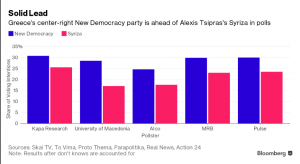Financial news site ‘Bloomberg’ warns that the decision by Greek PM Alexis Tsipras to attempt to change the country’s electoral system to proportional representation is a potentially risky move for political stability in the country.
Prime Minister Alexis Tsipras is pushing through changes to Greece’s electoral law that may boost his chances of securing another term in office while undermining the country’s political stability for the long term.
Tsipras’s government submitted legislation to parliament late Tuesday to scrap the 50-seat stability bonus awarded to the party that gets most votes in favor of a fully proportional system. With 153 lawmakers in the 300-seat legislature, Tsipras is far from the two-thirds majority he needs for his proposals to come into force in time for the next election, but with a simple majority the change will kick in for subsequent ballots.
The electoral overhaul may help Tsipras in the short term because his party, Syriza, is likely to be overtaken by the main opposition group, New Democracy, next time Greeks vote. But it will also leave Greece’s fragile political system more exposed to breakdown — in previous experiments with a more balanced system, governments lasted less than five months on average.
“The history of full proportional representation in Greece and in Europe leads to despair about the proposed overhauls,” said Thanassis Diamantopoulos, a professor of politics at Panteion University in Athens. “Governing coalitions will be short-lived and dysfunctional, and the instability will hold back potential investors.”
Economic Destruction
Tsipras is trying to rebuild the Greek economy after the worst recession since World War II and the recovery was derailed last year by the political instability of two elections and a referendum held a year ago this week. Though Tsipras promises that turmoil is over, investors are still to be convinced. Greece’s government bonds are the world’s worst performers over the past month while the losses on the Athens Stock Exchange have been eclipsed by only Nigeria and Venezuela.
The government’s term runs until 2019, but Tsipras’s slim majority and the raft of unpopular measures he has to push through to satisfy the terms of Greece’s euro-area bailout mean speculation about a snap election is constant in Athens.
As he tries to persuade voters to accept the conditions of the country’s financial lifeline, Tsipras argues that his changes will increase the legitimacy of parliament’s decisions because the stability bonus distorts the will of the people as expressed at the ballot box. Makis Balaouras, a Syriza lawmaker, said that the shift has been a long-standing commitment for his party and denied it was a tactical move for political gain. “Proportional representation will bring together parties with common social and political roots,” Balaouras said in an interview.
Syriza’s Slide
Under the current electoral system, 250 out of the 300 seats in parliament are distributed proportionally among all parties with at least 3 percent of the vote. The remainder goes to the winning party, to make it easier to form a stable majority.
Syriza secured 145 seats with 36 percent of the vote in last September’s election and governs in coalition with the populist Independent Greeks, who won 3.7 percent. Since then, Tsipras has seen his support plunge and his party trailed New Democracy by 21 percent to 15 percent in an Alco poll published by Parapolitika newspaper last week.
Tsipras is betting that whenever the country does go to the polls he’ll be able to force a repeat election to be held under the new rules and then form a coalition to squeeze out New Democracy, according to Costas Panagopoulos, the head of Alco. Under the Greek constitution, the party with the most seats has just three days to pull together a majority before the baton passes to the next biggest group, so the drawn-out negotiations that Spain has seen this year are impossible. It’s a risky gambit for Tsipras all the same, and it could have unintended results.
“Once this gun is fired, we can’t be sure who it will hit,” Panagopoulos said in an interview.
Diamantopoulos says Tsipras’s proposed changes will make it more difficult to form a government and even when majorities are formed they will be easily taken hostage by single-issue groups and extremist parties could prosper.
“Even in mature democracies with proportional representation like the Netherlands, or Belgium, negotiations for the formation of a new government often take months,” he said. “This is a recipe for disaster.”





































